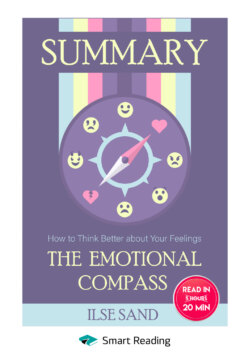Читать книгу Summary: The Emotional Compass. How to Think Better about Your Feelings. Ilse Sand - Smart Reading, Ольга Ганкова - Страница 2
Labyrinth of Emotions
ОглавлениеMany of us notice our feelings only after they have reached code red. "I can’t stand it anymore," "How is this even possible," "Don’t come near me." Sometimes we say these phrases many times a day without thinking what’s behind them and how they affect our relationships with our family, friends and colleagues. In succumbing to emotions, we lose the ability to empathize and evaluate the situation objectively. That leads to our making one mistake after another, and we put at risk the most precious things we have: relationships and our own inner peace.
But there is another extreme. Many people grow up not noticing their feelings at all. Some are afraid of conflicts, some try to please everyone, others cannot cope with strong feelings and choose to stuff them deep inside, preferably never to take them out again. But continually swallowing grief, ignoring sadness, suppressing fear and jealousy is a sure way to end up in a very bad emotional state, which can then grow into depression.
In her book "The Emotional Compass" Danish psychotherapist Ilse Sand teaches us to recognize emotions and feelings in their early stages. Such a skill will give you much more time to prepare yourself and choose how to respond. Sand worked with many different types of people: those who were ready to talk about their feelings all day long and those who were not at all inclined to self-reflection. Thanks to such a diverse experience she developed different ways of tackling the same tasks. In this book you’ll find not only real-world techniques that will help you figure out what you feel, but also examples of phrases you can use when talking to a person who has hurt you or whom you have hurt.
Ilse Sand states that emotions should not be divided into good and bad ones. All of them are useful, and by finding the real reasons why they appeared in the first place we can learn valuable lessons, even from such emotions as jealousy, envy, resentment and disappointment. And once you learn to differentiate between symptoms and the sickness, you can find a way out of the tricky and confusing labyrinth our feelings sometimes lead us into. Emotions are not always what they seem. Anger may hide deep sadness, while a soft smile may reveal a fear of being abandoned.
If you often get angry, shout, fight with your close ones or vice versa, or you cannot protect your boundaries, this book is for you. As Ilse Sand says, you can overcome anything. The main thing is to remember that we experience feelings, but are not defined by them.
